|
Trying to identify a large portrait found in a South Acton barn (see blog post), we thought it might be Henry Barker, a self-made businessman whose his cider mill was well-known and a local employer for many years. We were surprised that little had been written about Henry himself and that we could not find a photograph of him. If anyone has any pictures of Henry, his family, and/or the business that could be scanned or otherwise shared, we would be grateful to add them to our collection. Our first step was to search out Henry Barker’s obituary for the story of his life. We found a notice of his death in the Concord Enterprise (Aug. 29, 1917, p. 8), but we were disappointed to read that “He was one of the best known business men in this section for nearly 60 years and needs no obituary.” That was an unusual statement in the local paper; perhaps the editor did not have a lot of column room that day. We set out to learn what we could from other records. The Barker name is well-known in Acton. In fact, there are so many Barkers, it is a challenge to disentangle them. However, we do know that Henry Barker was an Acton native, born about 1835 to Isaac Barker and Olive Handley. (The birth was not recorded in Acton, but his death notice in the Enterprise mentioned that he had been born in “the old Gould house on the crossroad to West Acton.”) Henry had three brothers that we know of, Joseph Edwin b. c. 1831, Herman b. c. 1845, and Charles b. c. 1848. Henry’s mother Olive and sister Clara Sophia both died in September 1848. His father married again to Eliza A. G. Bragg on Nov. 8, 1854 in Roxbury. 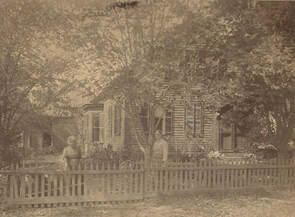 196 Main St (probably late 1880s) 196 Main St (probably late 1880s) Henry Barker married Louisa M. Atwood in Cornish, New Hampshire on Dec. 14, 1854. Children followed; Clara Louisa (probably born March 29, 1855; there was name confusion in the early records), Edson Henry (June 2, 1860- June 4, 1861), Addie Henrietta (b. Feb.4, 1863), Delmon Gustavus (Oct. 18, 1865-Oct. 18, 1869), Idella Josephine (b. May 10, 1869), Medora Carlotta (b. June 11, 1872), and Olive Genevra (b. Sept. 23, 1874). We do not know exactly where Henry lived in the first years of his marriage, but land records show that in 1860, Henry bought the house at 196 Main Street (on the outskirts of growing South Acton) from James and Susanna Graham. Henry’s father Isaac was listed in the 1855 census as a Mast Hoop and Truss Hoop manufacturer. Henry, married and in a separate household, was listed as a Mast Hoop Maker. In his son’s 1860 birth record, Henry was listed as a “Hoop Shaver.” By June 1863, Henry was listed in a military service register as a “Market-man.” (He did not go off to fight in the Civil War; he was apparently deaf in his right ear.) The Society has H. Barker’s Internal Revenue Service 3rd Class Peddler’s License dated Sept. 1, 1863 that had been saved by Henry’s daughter Addie. Henry was still listed in the 1865 Massachusetts census as a Marketman. Thanks to a note in an old scrapbook held in our library, we checked the probate record of farmer John Tenney (a neighbor of Henry’s father Isaac). We discovered in the November 1864 probate accounting that Henry Barker paid $25 to rent Tenney’s mill. As the only indications of mill products in Tenney’s estate were cider vinegar and barrels, it seems likely that Henry was already gaining experience operating a rented cider mill at that time. In 1867, Henry Barker bought about a quarter of an acre of land at approximately 150 Main Street (bordered on the other side by today’s Central Street) and built his own cider mill. The 1870 census lists him as a cider manufacturer with real estate of $5000 and personal possessions worth $4000. His household included his wife Louise M., daughters Clara L., Addie H. and Idella J., and brothers Herman and Charles, both listed as cider makers. (The brothers later moved closer to Boston. Herman eventually went into other ventures, but Charles remained in the business.) The 1872 town valuation shows that Barker’s operation included a cider mill with presses, an apple house, a bottling house, and $4000 stock in trade. Bill Klauer wrote about “Cider Production in Acton” in the Society’s Acton Revisited, Fall 2003. He noted that the Barker mill’s scales were located close to Main Street and their foundation can still be seen from the sidewalk. Farmers would have had their loads weighed, then apples were stored until they could be processed. The apples were sent to a grinding machine, and then the resulting pulp was squeezed in a strong press. The cider was collected in a large vat. The left-over pressed pulp was piled outside the mill, ready for farmers to haul away to be used as cattle feed. In modern times, preservatives allow sweet cider to be bottled and kept for long periods. Without preservatives, cider fermented. Hard cider was a common beverage in Massachusetts’ early days, but by the time Henry Barker was in business, it was a target of the temperance movement and was beginning to lose ground to beer as the alcoholic beverage of choice. Another cider product, vinegar, required additional aging (with exposure to oxygen and bacteria) beyond the first stage of fermentation. The Boston Daily Advertiser, (Saturday June 26, 1875, p. 1) reported that “The cider mills of Mr. Henry Barker at South Acton are in successful operation. About 1000 barrels of rectified vinegar are on hand, and a large amount of cider has been bottled. The mills are run by steam.” In that year, Briggs & Co.’s Middlesex County Directory, ran an ad for Henry Barker, “Manufacturer, and Wholesale Dealer in Crude and Refined Cider and Cider Vinegar, South Acton, Mass.” (p. 92) The business was clearly a success. Land purchases, a map dated 1889, and the 1890 Acton valuation show that Henry Barker enlarged his cider and vinegar operation over time, purchasing additional property on both sides of Central Street. In November, 1888, the Concord Enterprise reported that Henry Barker had put up the largest tank in the vicinity, 18 feet in diameter and 16 feet high. (Nov. 17, 1888, p. 2) Nearby, according to Mill Corner (Nylander and Forbes, p. 9), there was a spring (and a stone spring-house as early as 1875) on the opposite side of today’s Central Street from the mill that provided a water source. Next to the mill, the South Acton Universalist Church was built in 1878. By 1887, Henry had built an impressive home on the hill at 167 Main Street from which he could overlook the cider mill. The family seems to have owned a camera by that time and documented local scenes and some people, including this photo of “Stella” (probably Stella Heath, whose mother was a Barker) with the newly-constructed Henry Barker house in the background. In October 1888, daughter Addie married Frederick L. Burke whose occupation was “Traveling Agent.” Henry had a home built for them just down the hill at 177 Main Street (now the home of the Discovery Museum). Fred Burke worked in the cider business and eventually became the manager of the cider mill. The couple named their son Henry Barker Burke. Unusually for a man of such local success, Henry Barker did not show up much in the local newspaper except in the context of the cider mill. In town reports, we found that Henry Barker was paid during the 1890s for maintaining two street lamps (a private duty in those days). Henry Barker established a Boston store/office at 88 Commercial Street, a location not far from the waterfront, sometime between 1875 and 1878 when he was listed in Sampson, Davenport, and Company’s Boston Directory in the business of “vinegar, &c.”(p. 81). He was listed in 1883 as an agent for an industry newspaper at the same address (Geo. P. Rowell and Co.'s American Newspaper Directory, 1883, p. 610) and appeared there in Boston directories for the rest of his life. Brother Charles was listed in the 1880 Boston City Directory as a salesman at 88 Commercial St., living in South Acton. (p. 83) By 1882, the Malden directory showed him as a resident, working in “cider vinegar (88 Commercial, B.)” (p. 37) and Boston directories showed him in the business there in later years, including 1900 and 1915. In the late 1880s, temperance agitation started to lead to legislative bans on the sale of “intoxicating liquors.” There was much uncertainty about whether cider, which was ”sweet” for only a short period before it fermented, would also be banned. The farmers of Acton, Boxborough and Stow were concerned about the effect of bans on their apple business, and confusion could not have been good for the Barker operation, either. Probably as a result, Henry Barker of South Acton was elected as a director of the Fruit Growers, Cider and Cider Vinegar Makers’ Association of Massachusetts. (Boston Journal, Jan. 8, 1890, p. 4) Apple production and the cider vinegar industry made it through that period. 1896 saw a particularly large crop of apples. The Enterprise reported on October 1 that “Henry Barker received 1800 barrels of cider apples at his mill in three days last week. He is running his mill night and day.” (p. 8). On November 19, the Enterprise reported “Henry Barker is building another large tank for cider; he has already ground over 20,000 barrels and still they come.” (p. 8) During the autumn, the pressure to process all of the apples must have been intense. According to Phelan’s History of the Town of Acton, the Barker mill “ turned out thousands of barrels of cider which was stored in huge tanks and eventually shipped to the vinegar dispensing companies.... In a season when the fruitage was heavy, a combination of wind and rain could mean thousands of bushels arriving at the mill.... Wagons loaded to the limit would now and again form a queue a hundred yards long at the Barker mill.”(p. 263) Apples would also come in by rail from farmers farther afield. The Concord Enterprise of Oct. 21, 1897 mentioned apples being received by train from New Hampshire. (p.8) The Society has one picture of the Barker Cider Mill, date unknown but probably before 1900; see blog post on photographer F. J. Taylor for an idea of the date. (F.J. Taylor took at least one other picture of the mill complex; the Society would be grateful for a copy or a scan.) The business had its share of troubles and tragedies. The Boston Daily Globe reported in 1887 that “an undersized boy of 14” expertly opened the cider mill’s safe (armed with a revolver). He was caught and fortunately no one was hurt. (Sept. 30, p. 13) In October, 1896, however, employee John Jackman was found expired in the large tank after having been at work all day. It was thought that he had been overcome by gasses. (Concord Enterprise, Oct. 15, 1896, p. 8, Acton death record) This may have been the reason the new tank was built in November 1896.
In the early morning hours of October 28, 1900, a fire started near the engine room of the Barker cider mill. A watchman alerted the village, and firemen came from the other Acton villages and Maynard, but their pumping soon overwhelmed the water supply from the spring-fed basin across the street. Barker’s storage tanks started leaking many gallons of cider, and someone had the idea to pump cider to douse the flames. It was an unsuccessful attempt, and two large buildings of the cider plant burned to the ground. The firemen were able to save a large storehouse, the large tank outside the building, and 55,000 gallons of vinegar. The thirty to forty men who had been working there at the time lost their source of employment, at least temporarily. (Concord Enterprise, Nov. 1, 1900, p. 8; Boston Herald, Oct. 29, 1900, p. 3) In the Enterprise, Henry Barker thanked all those who had come to assist in putting out the fire (Nov. 1, 1900, p. 8). After a period of uncertainty, on December 12, the Enterprise reported that Henry Barker would rebuild his mill on the old site. (p. 8) At the March 25, 1901 town meeting, Acton voted to upgrade its fire-fighting capacity immediately, to buy 800 more feet of rubber-lined hose for South Acton, and to purchase “the F. R. R. water supply basin located near the cider mill of Henry Barker [and to] excavate and properly fix said basin for a possible water supply in case of fire.” Also, the town voted to hire “a competent man at each part of the town where fire apparatus is located to properly care for it.” One might have expected Henry Barker to slow down by the 1900s, but apparently, he did not. In 1908, the Enterprise reported that after a serious illness, “Henry Barker is able to attend to his business again and goes daily to Boston.” (Apr. 29, p8) On January 22, 1914, Henry’s wife Louisa (Atwood) Barker passed away at the age of 81, after an illness of several months. Sometime in 1917, Henry moved to Dorchester to stay with his daughter. He remarried that summer; Acton’s records show that Henry Barker, merchant, age 82 (born in Acton, son of Isaac Barker and Olive Handley) married Emma C. (Sawyer) Gove of Boston, age 53 on July 28, 1917. Unfortunately, the marriage lasted only a few weeks. On August 15, 1917, the Concord Enterprise reported that Henry Barker, who had been living in Dorchester for a few months, was suffering from gangrene of the foot. He had been operated on at the Forest Hills hospital, and there was at first hope for recovery. (p. 8) Unfortunately, he died in Boston on August 23, 1917. He was buried in Woodlawn Cemetery. His heirs were his daughters, listed in the Concord Enterprise as Clara L. Barker, Addie H. Burke, Della J. Tuttle, all of Acton, and Olive G. B. Hunt and Medora C. Robbins, both of Melrose. (Sept 12, p. 4) The Barker mill in South Acton operated for many years after Henry’s death. Owned at first by Addie (Barker) Burke then her husband Fred, it was later bought by J. P. W. von Laer Company of Boston. Fred Burke became a partner in the enterprise and continued to manage the mill until his death in 1940. On October 27, 1951, the Barker Mill burned down again. It was the end of an era. Comments are closed.
|
Acton Historical Society
Discoveries, stories, and a few mysteries from our society's archives. CategoriesAll Acton Town History Arts Business & Industry Family History Items In Collection Military & Veteran Photographs Recreation & Clubs Schools |
Quick Links
|
Open Hours
Jenks Library:
Please contact us for an appointment or to ask your research questions. Hosmer House Museum: Open for special events. |
Contact
|
Copyright © 2024 Acton Historical Society, All Rights Reserved
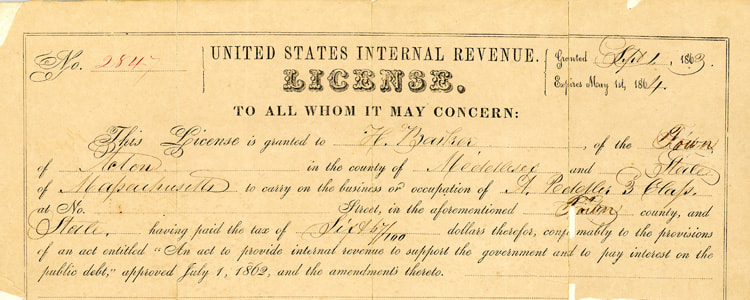
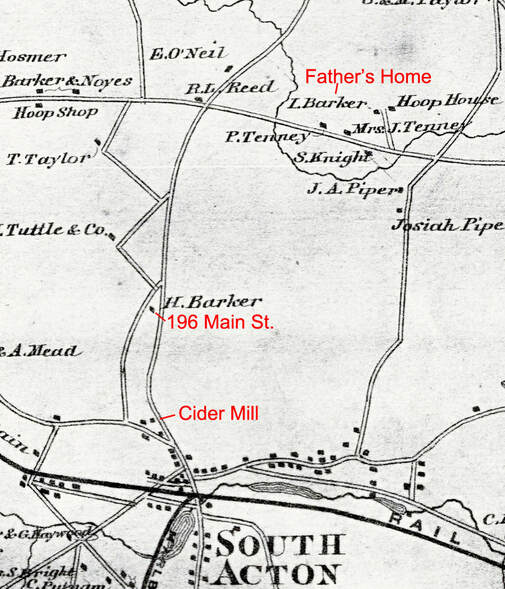
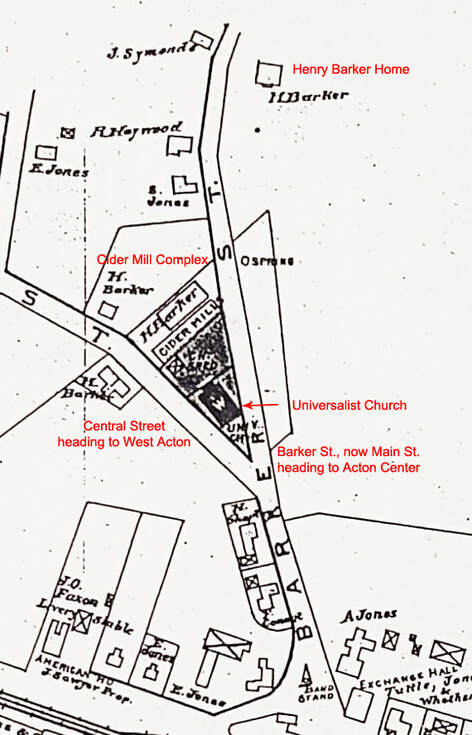
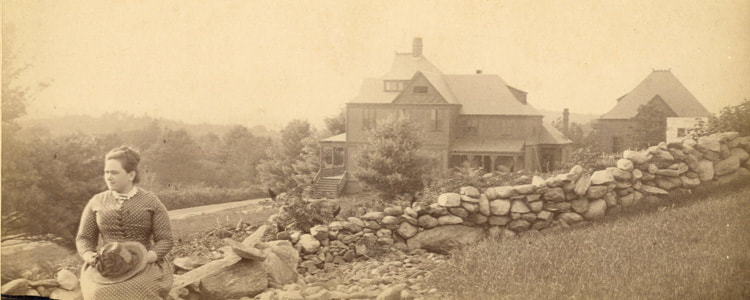
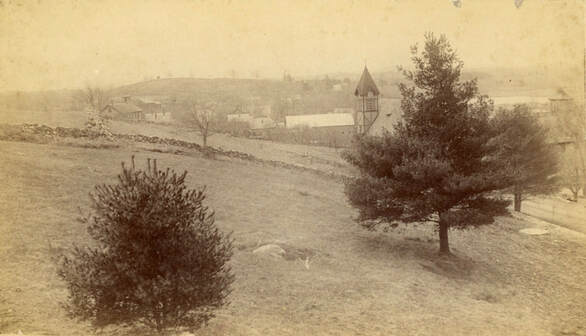

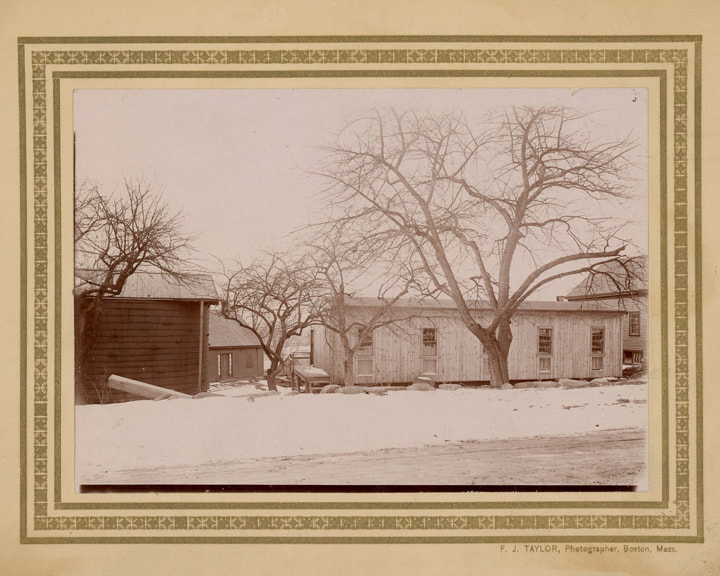
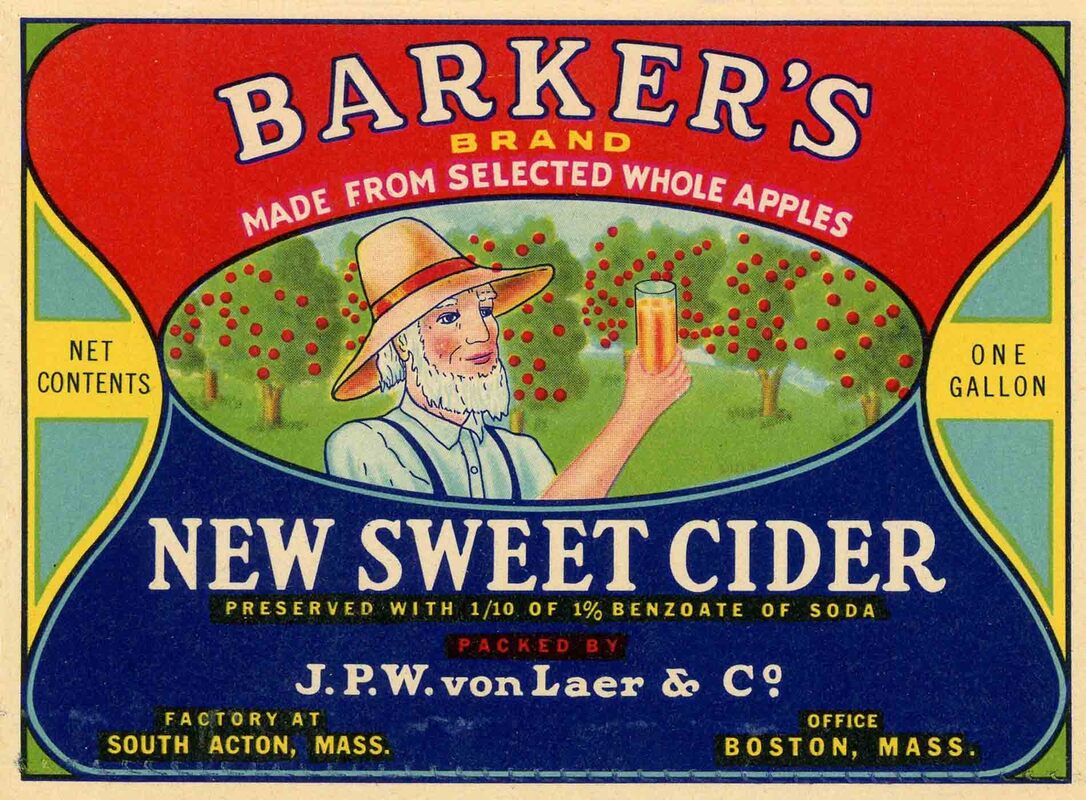
 RSS Feed
RSS Feed